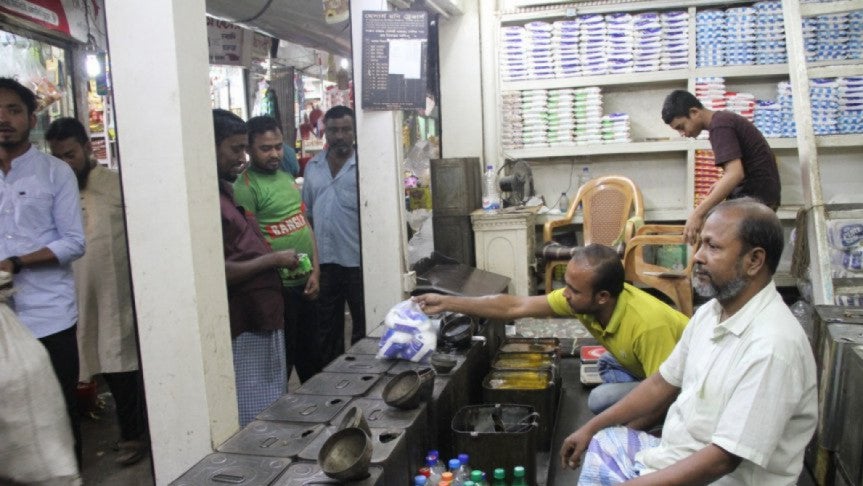Authentic info must be disseminated fast to defeat rumour mill

Social media now have turned out to be a means of spreading rumours to manipulate markets by unscrupulous businesspeople to make quick buck by fooling people and this menace has to be tackled through dissemination of authentic information fast, said experts.
As a rumour sent city dwellers on panic buying of salt on Tuesday, they said authentic information need be disseminated instantly through the mainstream media alongside taking prompt actions against wrongdoers to check rumours that destabilise markets.
As the rumour of salt crisis spread like flame, people across the country, especially the capital, were seen thronging grocery stores to buy the item in fear of facing any onion-like crisis.
Contacted, Dhaka University’s former VC and media expert Prof AAMS Arefin Siddique said the salt price was increased artificially based on a rumour. “There’s no genuine reason for the hike in salt price since the country has enough stock of it. So, both the rumour and those who spread it must be prevented by enforcing law.”
“When there’s a lack of authentic information, people believe rumours. So, the government should urgently disseminate the right information whenever any rumour is spread. In the case of salt, the government came up with accurate information quickly. That’s good.”
But, Dr Arefin said, people will believe the right formation about the salt when they will see its impact on the market. “The government is saying there’s no crisis of salt, but people are not getting it at shops. So, how people will believe the government if it can’t ensure proper supply of the item in the market. The availability of salt must be ensured. ”
He said there is a serious weakness in the government’s market monitoring system. “The government must actively monitor the market and remove wrong information about the prices and stocks of goods and essentials.”
Stating that manipulating the market and increasing the prices of essentials by creating an artificial crisis is a serious crime, he regretted that the government could not properly identify the illegal onion hoarders and those increased its price unusually. “Had the onion market manipulators been punished, the similar problem over salt wouldn’t have created.”
MM Akash, a professor of Dhaka University Economics department, said, “As we’re now living in the age of ICT, any information is now spreading like flame, and social media platforms are playing the main role in it.”
He said a system should be there to control rumour and misinformation on the social media.
Prof Akash said now rumour and false information are being used to manipulate the market and increase the prices of particular essential commodities like onion, rice and salt. “People need to be aware of false information and they shouldn’t believe anything without verification.”
He said some unscrupulous businessmen sometimes indulge in ‘speculative trade’ spreading rumours. “In economics, we call it moral hazard. The dishonest businessmen get such a scope to manipulate the market due to information asymmetry or lack of equal knowledge on any issue or matter.”
“So, we must remove the information asymmetry to check such market manipulation by instantly giving people the right information through all the forms of mainstream media. Whenever wrong information are disseminated by any vested quarter, the government will have to give people the right information instantly through radio and television channels, and social media platforms. We must fight against the false with truth.”
Besides, he said, those who spread rumours and false information must be tracked down and given exemplary punishment to prevent such foul play with common people.
However, the government urged all not to get confused with misleading information over salt stock and price being spread by an unscrupulous group saying the current salt reserve is much more than the country needs.
“There’s no shortage of salt. At present, the salt stock in the country is much higher than the demand,” said Chairman of Bangladesh Small & Cottage Industries Corporation (BSCIC) Md Mostaque Hassan.
He said an unholy syndicate is trying to reap benefits by spreading misleading information through online media. “The people of the country are requested not to get confused.”
Panic Buying
In Dhaka, although grocery wholesale market in Karwan Bazar remained closed on Tuesday, a good number of general customers were seen around the market to buy salt.
Visiting different city areas including Malibagh, Shantinagar, Jatrabari, Rampura and Hatirpool areas, it was seen the grocery stores were overcrowded with salt buyers, creating an artificial high demand of the item.
Taking advantage of the evolving situation, many retailers were selling salt at 80-100 per kg.
According to reports reaching the UNB desk from across the country, the salt price went up to Tk 200 at many places as people were flocking to shops to by the item.
Meanwhile, the mobile courts in different districts, including Sylhet, Natore, Bogura, Munshiganj and Thakurgaon, fined many shopkeepers for selling slat at a higher price.

 UNB
UNB